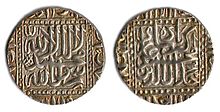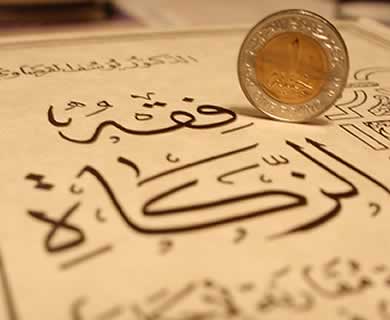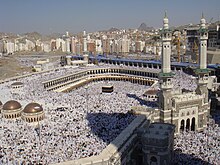The Pillars of Islam (arkan al-Islam; also arkan ad-din,
"pillars of religion") are five basic acts in Islam, considered
obligatory for all believers. The Quran presents them as a framework for
worship and a sign of commitment to the faith. They are (1) the shahadah (creed), (2) daily prayers (salat), (3) almsgiving (zakah), (4) fasting during Ramadan and (5) the pilgrimage to Mecca (hajj) at least once in a lifetime. Both Shia and Sunni sects agree on the essential details for the performance of these acts.
Testimony
Shahadah
Silver coin of the Mughal Emperor Akbar with inscriptions of the Islamic declaration of faith, the declaration reads: "There is no God but Allah, and Muhammad is the messenger of God."
Main article: Shahadah
The Shahadah, which is the basic creed of Islam that must be recited under oath with the specific statement: "'ašhadu 'al-lā ilāha illā-llāhu wa 'ašhadu 'anna muħammadan rasūlu-llāh",
or "I testify that there are no deities other than Allah alone and I
testify that Muhammad is his Messenger." This testament is a foundation
for all other beliefs and practices in Islam. Muslims must repeat the shahadah in prayer, and non-Muslims wishing to convert to Islam are required to recite the creed.
Prayer
Salat
Ritual prayers, called Ṣalāh or Ṣalāt (Arabic: صلاة), must be performed five times a day. Salat is intended to focus the mind on God, and is seen as a personal communication with him that expresses gratitude and worship. Salat is compulsory but flexibility in the specifics is allowed depending on circumstances. The prayers are recited in the Arabic language, and consist of verses from the Qur'an. The prayers are done with the chest in direction of the kaaba though in the early days of Islam, they were done in direction of Jerusalem.
A mosque is a place of worship for Muslims, who often refer to it by its Arabic name, masjid. The word mosque
in English refers to all types of buildings dedicated to Islamic
worship, although there is a distinction in Arabic between the smaller,
privately owned mosque and the larger, "collective" mosque (masjid jāmi`). Although the primary purpose of the mosque is to serve as a place of prayer, it is also important to the Muslim community as a place to meet and study. Al-Masjid al-Nabawi the Prophets Mosque in Madina was also a place of refuge for the poor.
Modern mosques have evolved greatly from the early designs of the 7th
century, and contain a variety of architectural elements such as minarets.
Alms-giving
"Zakāt" (Arabic: زكاة zakāh "alms")
is giving a fixed portion of accumulated wealth by those who can afford
it to help the poor or needy and for those employed to collect Zakat;
also, for bringing hearts together, freeing captives, for those in debt
(or bonded labour) and for the (stranded) traveller.
It is considered a religious obligation (as opposed to voluntary
charity) that the well-off owe to the needy because their wealth is seen
as a "trust from God's bounty". Conservative estimates of annual zakat
is estimated to be 15 times global humanitarian aid contributions. The amount of zakat to be paid on capital assets (e.g. money) is 2.5% (1/40) per year,
for people who are not poor. The Qur'an and the hadith also urge a
Muslim to give even more as an act of voluntary alms-giving called Sadaqah.
Fasting
Sawm
Fasting, (Arabic: صوم ṣawm), from food and drink (among other things) must be performed from dawn to dusk during the month of Ramadhan.
The fast is to encourage a feeling of nearness to God, and during it
Muslims should express their gratitude for and dependence on him, atone
for their past sins, and think of the needy. Sawm is not
obligatory for several groups for whom it would constitute an undue
burden. For others, flexibility is allowed depending on circumstances,
but missed fasts usually must be made up quickly.
Pilgrimage
Hajj
The pilgrimage, called the ḥajj (Arabic: حج, has to be done during the Islamic month of Dhu al-Hijjah in the city of Mecca. Every able-bodied
Muslim who can afford it must make the pilgrimage to Mecca at least
once in his or her lifetime. Rituals of the Hajj include: spending a day
and a night in the tents in the desert plain of Mina, then a day in the
desert plain of Arafat praying and worshiping God, following the foot
steps of Abraham. Then spending a night out in the open, sleeping on the
desert sand in the desert plain of Muzdalifah, then moving to Jamarat,
symbolically stoning the Devil recounting Abraham's actions. Then going to Makkah and walking seven times around the Kaaba which Muslims believe was built as a place of worship by Abraham. Then walking seven times between Mount Safa and Mount Marwah
recounting the steps of Abraham's wife, while she was looking for water
for her son Ismael in the desert before Mecca developed into a
settlement.



No comments:
Post a Comment